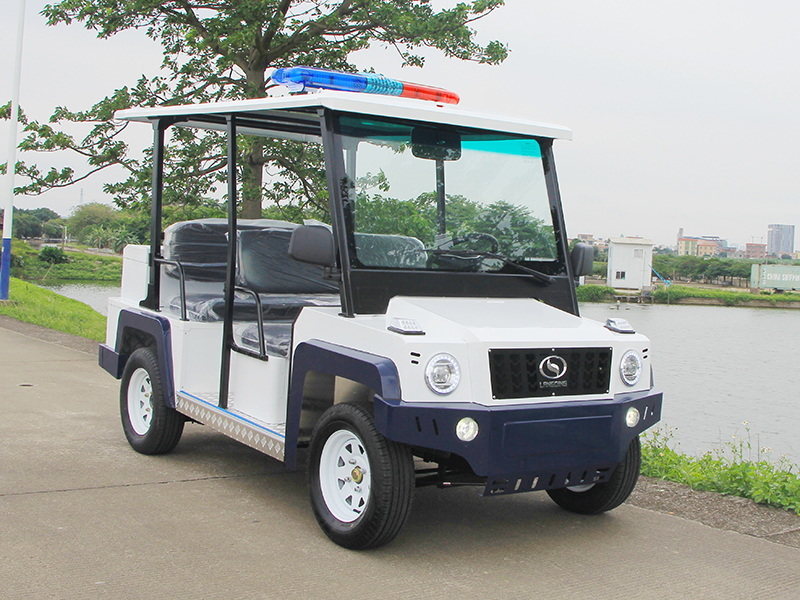Content Menu
● Introduction to Hyattsville MD Police Department's Electric Patrol Cars
● Why Switch to Electric Patrol Cars?
>> Environmental Responsibility
>> Cost Savings on Fuel and Maintenance
>> Performance Advantages
>> Technological Innovation and Leadership
● Modifications and Challenges of Electric Patrol Cars
>> Vehicle Upfitting
>> Range and Charging Considerations
>> Vehicle Size and Features
>> Weather and Durability
● Supporting Infrastructure: EV Charging Stations in Hyattsville
● Community Impact and Public Perception
● Future Outlook for Electric Patrol Cars in Hyattsville and Beyond
● Conclusion
● FAQ
>> 1. What specific electric vehicles are used by the Hyattsville MD Police Department?
>> 2. How does the electric patrol car handle police equipment power needs?
>> 3. What are the main benefits of electric patrol cars for police departments?
>> 4. Are there any limitations to using electric vehicles for patrol?
>> 5. How does Hyattsville support EV charging for its police fleet?
The Hyattsville MD Police Department has made a significant transition by incorporating electric patrol cars into their fleet. This move reflects a growing trend among law enforcement agencies to adopt cleaner, more sustainable, and cost-effective technologies. This article explores the reasons behind this switch, the benefits, challenges, and the future outlook of electric vehicles (EVs) in police work, with a particular focus on the Hyattsville MD Police Department electric patrol car initiative.

Introduction to Hyattsville MD Police Department's Electric Patrol Cars
The Hyattsville MD Police Department operates a fleet of approximately 70 vehicles, including patrol cars, investigative units, and emergency response vehicles. Traditionally, most of these vehicles were gasoline-powered. However, the department has been actively working to make its fleet greener by introducing all-electric and hybrid-electric vehicles whenever possible. Among the vehicles in operation are:
- 2017 Chevrolet Bolt All-Electric Fully Marked Police Vehicle (the first of its kind in the U.S.)
- 2017 & 2018 Zero DSP All-Electric Fully Marked Police Motorcycles
- 2021 Ford Interceptor Hybrid Fully Marked SUVs
- 2017 Ford Fusion Hybrid Unmarked Police Vehicle
- Segway All-Electric Personal Assistive Mobility Devices
- All-Electric Golf Cart for special events
Additionally, seven patrol vehicles and a specialized rescue vehicle have been equipped with anti-idling devices to reduce emissions while running emergency equipment without the engine running.
Why Switch to Electric Patrol Cars?
Environmental Responsibility
One of the primary motivations for the Hyattsville MD Police Department to switch to electric patrol cars is environmental sustainability. Gasoline-powered vehicles emit pollutants that contribute to air pollution and climate change. Electric vehicles produce zero tailpipe emissions, helping the department reduce its carbon footprint and promote cleaner air in the community.
The city of Hyattsville, located in Maryland near Washington D.C., has made sustainability a priority in its municipal operations. By adopting electric patrol cars, the police department aligns with broader city goals to reduce greenhouse gas emissions and improve public health. This transition also sets a positive example for residents and other local government agencies.
Cost Savings on Fuel and Maintenance
Electric vehicles are cheaper to operate over time. The Hyattsville police Chevrolet Bolt EV has demonstrated over 75% savings in operating costs related to energy and maintenance compared to traditional gas-powered cruisers. EVs have fewer moving parts, require less frequent servicing, and eliminate the need for oil changes, transmissions, and exhaust system repairs.
These savings are significant for a municipal police department working within budget constraints. Fuel costs for gasoline vehicles fluctuate and can be unpredictable, whereas electricity prices tend to be more stable and lower overall. The department's experience shows that investing upfront in electric patrol cars can lead to substantial long-term financial benefits.
Performance Advantages
The Chevrolet Bolt EV used by Hyattsville PD accelerates from zero to 60 mph in about 6.4 seconds, faster than many traditional police vehicles. The electric motor provides instant torque, which is beneficial for urban patrol duties. The vehicle is electronically limited to 90 mph, which suits urban and suburban patrol needs. Additionally, the Bolt is much quieter than gasoline vehicles, which can be advantageous for stealth operations.
The quiet operation of electric patrol cars also improves community relations by reducing noise pollution during routine patrols and non-emergency activities. Officers report that the smooth and responsive handling of the Bolt EV enhances their ability to navigate city streets efficiently.
Technological Innovation and Leadership
Hyattsville PD was the first in the country to deploy a fully marked Chevrolet Bolt EV as a patrol car, showcasing leadership in adopting new technologies. The department's technical services manager, Sgt. Richard Hartnett, an EV enthusiast, played a key role in pushing this initiative forward. The department's experience serves as a model for other law enforcement agencies considering electrification.
By embracing electric patrol cars early, Hyattsville PD has gained valuable data and operational insights that can inform best practices for other departments. Their proactive approach demonstrates how law enforcement can be part of the solution to environmental challenges while maintaining public safety standards.

Modifications and Challenges of Electric Patrol Cars
Vehicle Upfitting
Police vehicles require specialized equipment such as emergency lights, sirens, radios, and computers. These devices draw power from the vehicle's electrical system. Unlike gasoline vehicles, EVs do not have an alternator to recharge the 12-volt battery, so Hyattsville PD had to ensure the Bolt's electrical system could handle the additional load. The department installed a charge guard device that cuts power to non-essential equipment one hour after the vehicle is turned off to prevent battery drain.
This modification was critical because police vehicles often need to keep emergency equipment running while parked or idling. The charge guard allows officers to leave radios and computers on without risking a dead battery, ensuring the vehicle is ready for immediate response.
Range and Charging Considerations
The Chevrolet Bolt EV has a range of approximately 230 miles on a full charge, which is sufficient for many administrative and patrol duties. However, the charging time—ranging from 30 minutes to two hours for a full charge—poses challenges for officers on 12-hour shifts who are constantly on the move. The department has addressed this by installing multiple Level 2 (240 Volt) charging stations around the city, including fast chargers, to support vehicle readiness.
The department also strategically schedules vehicle use and charging times to maximize availability. Officers are trained on efficient charging practices, and the fleet management team monitors battery levels to avoid operational disruptions.
Vehicle Size and Features
The Bolt is smaller and less roomy than traditional police sedans, and its design limits some features, such as the installation of a driver-side spotlight used for checking addresses or suspicious vehicles. Despite this, the department found the benefits outweighed these limitations.
To compensate, officers use handheld flashlights and other portable equipment. The department is also exploring newer electric SUV models that offer more space and flexibility for police upfitting needs, which may become part of future fleet upgrades.
Weather and Durability
Hyattsville experiences a range of weather conditions, including hot summers and cold winters. The department tested the Bolt EV's performance in various weather scenarios to ensure reliability. The vehicle's battery management system effectively maintains battery health and range in cold temperatures, although range can decrease somewhat in extreme cold.
The electric patrol cars have proven durable for daily urban use, withstanding the demands of stop-and-go traffic, quick acceleration, and frequent stops. The department continues to monitor long-term durability and battery life as part of their ongoing evaluation.
Supporting Infrastructure: EV Charging Stations in Hyattsville
The City of Hyattsville has invested in public EV charging infrastructure to support the police department's electric fleet and encourage community adoption of EVs. Charging stations are available in several city parking lots, including:
- City Parking Lot #4 (4320 Farragut Street) with 2 Level 2 stations
- City Parking Lot #2 (4300 Hamilton Street) with 2 Level 2 stations
- City Parking Lot #1 (5123 Baltimore Ave) with 4 Level 2 stations
- Municipal Building Parking Lot (4310 Gallatin Street) with two 50kW DC fast chargers supporting CHAdeMO and CCS Combo plugs
Charging at Level 2 stations is free, with a parking fee during business hours, while fast chargers have a session fee to cover electricity and maintenance costs.
This infrastructure not only supports the police fleet but also encourages residents and visitors to switch to electric vehicles by providing convenient charging options. The city's commitment to expanding EV infrastructure aligns with state and regional goals to reduce transportation emissions.
Community Impact and Public Perception
The Hyattsville MD Police Department's adoption of electric patrol cars has garnered positive attention from the community and local media. Residents appreciate the department's efforts to reduce pollution and noise, contributing to a healthier and quieter neighborhood environment.
Public demonstrations and open houses featuring the electric patrol cars have helped educate citizens about EV technology and its benefits. This outreach fosters trust and engagement between law enforcement and the community, showing that the department is forward-thinking and environmentally conscious.
The department also collaborates with local environmental groups and participates in sustainability initiatives, further strengthening community ties.
Future Outlook for Electric Patrol Cars in Hyattsville and Beyond
The success of the Hyattsville MD Police Department electric patrol car program has encouraged plans for expanding the electric fleet. The department is evaluating newer electric SUV models with longer range and more space for police equipment, aiming to replace aging gasoline vehicles as they retire.
Advancements in battery technology and charging infrastructure will continue to improve the viability of electric patrol cars for law enforcement agencies nationwide. As costs decrease and technology matures, more departments are expected to follow Hyattsville's lead.
Moreover, the integration of electric vehicles with smart city technologies, such as real-time fleet monitoring and renewable energy sources for charging, will enhance operational efficiency and sustainability.
Conclusion
The Hyattsville MD Police Department's switch to electric patrol cars is driven by a commitment to environmental sustainability, cost efficiency, and technological innovation. Their pioneering use of the Chevrolet Bolt EV as a fully marked patrol vehicle demonstrates that electric vehicles can meet the rigorous demands of police work in urban settings. While challenges like charging infrastructure and vehicle modifications exist, the benefits of lower emissions, reduced operating costs, and improved performance make electric patrol cars a promising direction for modern law enforcement fleets. The Hyattsville experience serves as a valuable case study for other police departments considering electrification, highlighting the importance of leadership, planning, and community engagement in successful adoption.

FAQ
1. What specific electric vehicles are used by the Hyattsville MD Police Department?
The department uses a 2017 Chevrolet Bolt all-electric patrol car, 2017 and 2018 Zero DSP electric motorcycles, 2021 Ford Interceptor Hybrid SUVs, a 2017 Ford Fusion Hybrid, Segway electric mobility devices, and an all-electric golf cart for special events.
2. How does the electric patrol car handle police equipment power needs?
The Bolt EV was equipped with a charge guard device that cuts power to emergency lights, radios, and computers one hour after the vehicle is turned off to prevent battery drain, since EVs lack an alternator.
3. What are the main benefits of electric patrol cars for police departments?
Benefits include zero emissions, lower operating and maintenance costs, quieter operation, instant torque for quick acceleration, and reduced environmental impact.
4. Are there any limitations to using electric vehicles for patrol?
Yes, limitations include charging time requirements, smaller vehicle size limiting some equipment installation, and range constraints, although current EV ranges are sufficient for many patrol duties.
5. How does Hyattsville support EV charging for its police fleet?
The city has installed multiple Level 2 charging stations and fast chargers in public parking lots, providing free or low-cost charging to support the police department's electric vehicles.










































